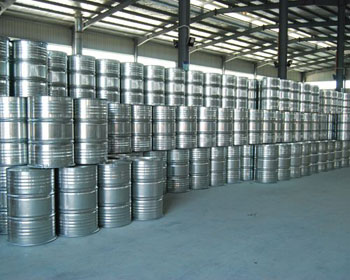Dimethyl Carbonate (DMC)

| Physical and chemical properties | Color and smell state: colorless, transparent, slightly sweet liquid | ||
| Toxicity: low toxicity | Flammability: flammable | ||
| Density: 1.071 | Volatility: Volatile | ||
| Boiling point: 90.3℃ | Stability: stable | ||
| Melting point: 2-4 ℃ | Acidity and alkalinity: Neutral | ||
| Hygroscopicity: poor | Flash point: 17 ℃ | ||
| Solubility: insoluble in water, miscible in most organic solvents, acids and alkalis | |||
| Various numbers | CAS:616-38-6 | HS: 2920909090 | EINECS: 210-478-4 |
| Uses | In industry, it can be used to prepare polycarbonate, water treatment agent. In medicine and pesticide, it can be used to prepare ciprofloxacin, carbachol, etc. It is also one of the essential raw materials for preparing high-energy battery electrolyte. Due to its excellent chemical properties and environmental protection effect (extremely low toxicity), Dimethyl Carbonate is widely used in coatings, inks and adhesives. It is a good organic solvent, known as the 21st century green chemical products, because of the wide range of uses, known as today's organic synthesis New cornerstone". | ||
| Hazard category | Class 3.2, medium flash point flammable liquid | ||
| Fire-fighting measures | Extinguishing method: Extinguish the fire in the upwind direction. Use carbon dioxide, sand, water mist, foam, and dry powder to extinguish the fire. Water can be used to keep the container cool at critical times. | ||
| Emergency treatment | If splashed on skin or clothes, rinse with water, splashed into eyes, rinse with running water or physiological saline; if inhaled, leave the scene to a place with fresh air, give oxygen, artificial respiration, and seek medical attention; if ingested, drink enough warm water, Induce vomiting and seek medical attention. | ||
| Packaging, storage, transportation | It can be packed in galvanized iron drum (200kg/drum), ISO TANK or stainless steel tank. Store in a cool, dry, and well-ventilated non-combustible warehouse. Keep away from fire and heat sources. The storage temperature should not exceed 10℃. Keep the container tightly closed. It should be stored separately from oxidants, reducing agents, acids, etc., and avoid mixed storage. Use explosion-proof lighting and ventilation facilities. It is forbidden to use mechanical equipment and tools that easily generate sparks. The storage area should be equipped with leakage emergency treatment equipment and suitable storage materials. The shelf life of airtight barrels is one year. The storage effect of atmospheric tanks is not as good as barrels, so it is not suitable for long-term storage. Transport as required by dangerous goods |
||
Next product: Glycerin (glycerol)

